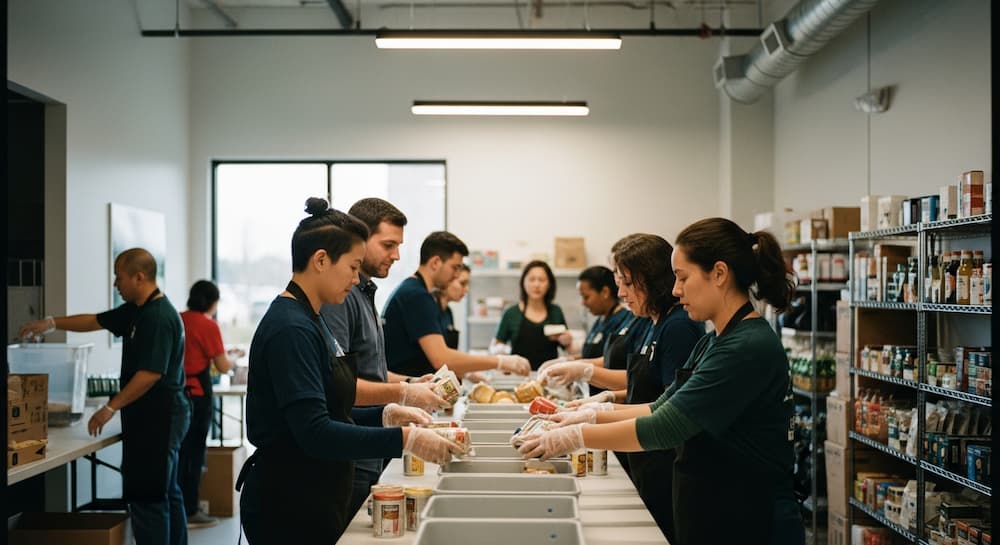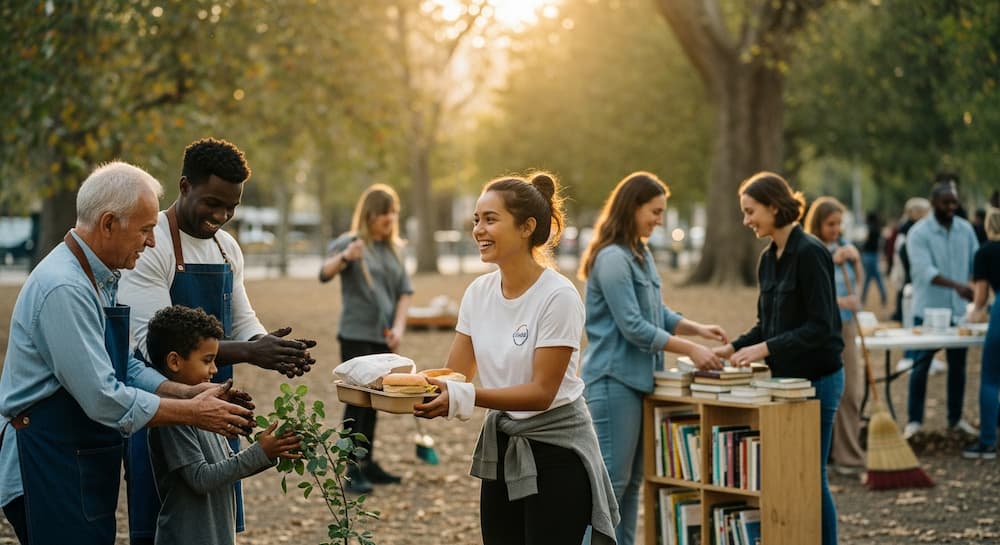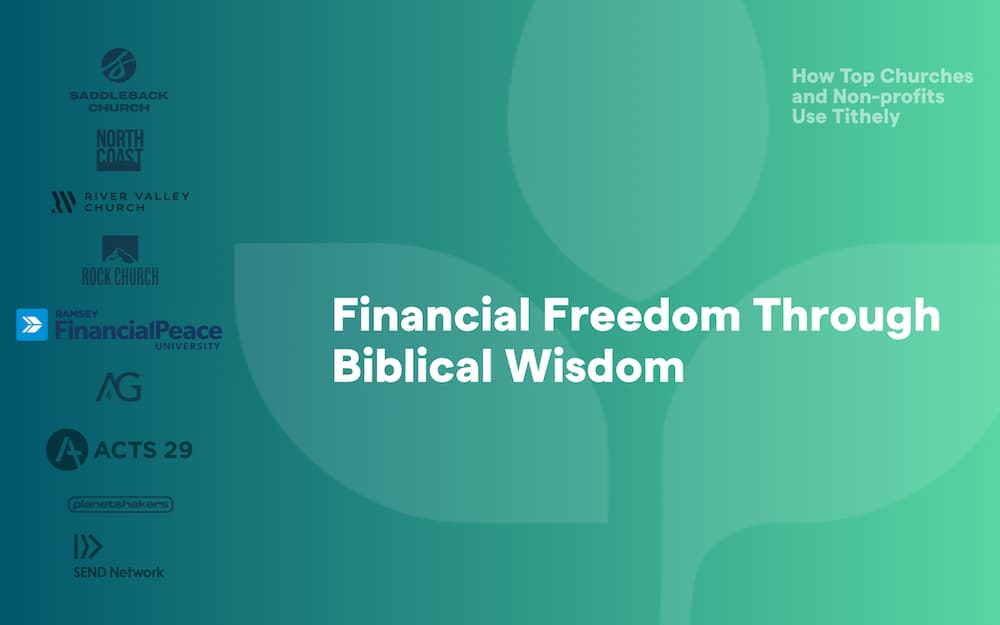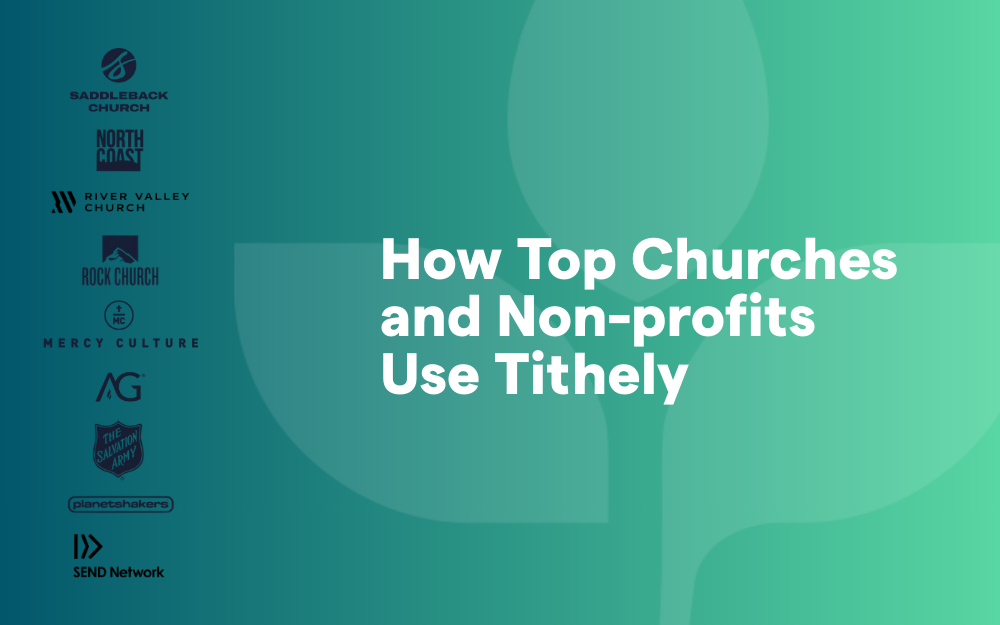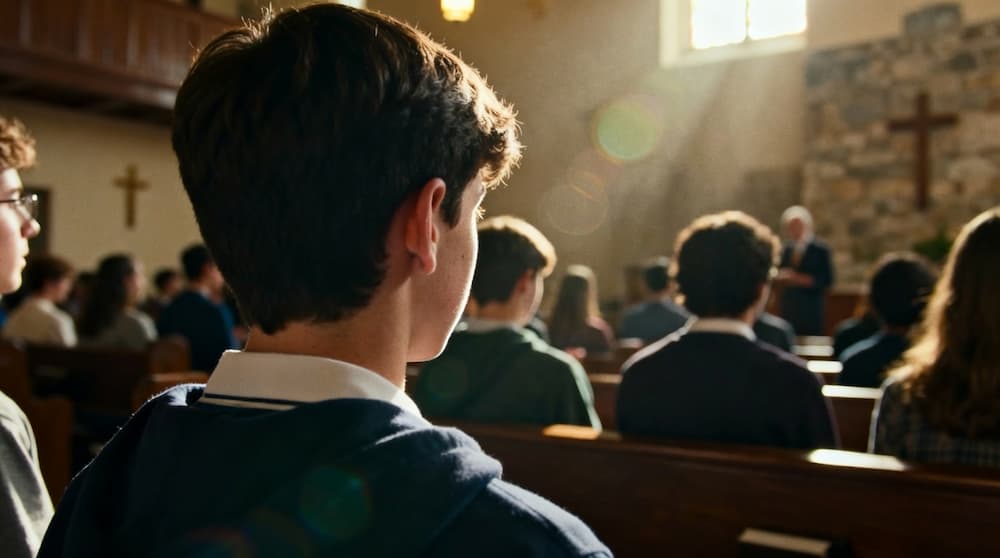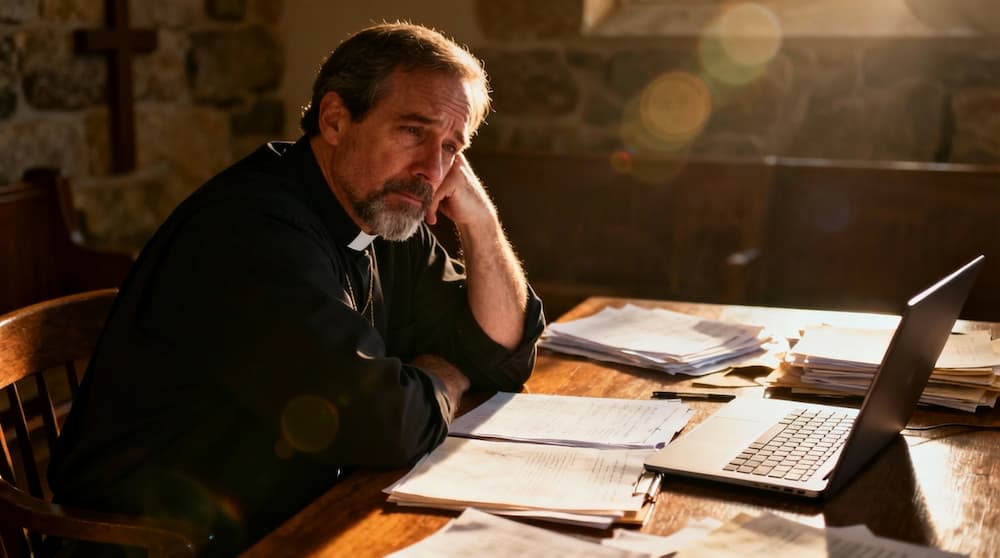How to Tell Compelling Stories to Increase Giving with Phil Bowdle
This week on Tithe.ly TV, Dean and Frank are joined by Phil Bowdle, a creative arts pastor and author of Rethink Communication, to talk about how you can tell compelling stories to unleash generosity.
.jpeg)
This week on Tithe.ly TV, Dean and Frank are joined by Phil Bowdle, a creative arts pastor and author of Rethink Communication, to talk about how you can tell compelling stories to unleash generosity.
During their conversation, they discuss:
- Why storytelling is so powerful
- 4 questions every great story answers
- Stories church leaders should tell
- How churches of any size can tell compelling stories
Resources
Here’s a list of the resources mentioned during the show:
- Phil Bowdle
- Rethink Communication: A Playbook to Clarify and Communicate Everything in Your Church
- 15 Shocking (and True) Statistics About Church Offerings
- Unleashing Millennial Generosity: 5 Ways to Encourage Giving Among Today’s Young Adults
- Tithe.ly Giving
- Tithe.ly on Facebook
- Tithe.ly on YouTube
- Tithe.ly on Instagram
- Tithe.ly on Twitter
Sign Up for Product Updates
This week on Tithe.ly TV, Dean and Frank are joined by Phil Bowdle, a creative arts pastor and author of Rethink Communication, to talk about how you can tell compelling stories to unleash generosity.
During their conversation, they discuss:
- Why storytelling is so powerful
- 4 questions every great story answers
- Stories church leaders should tell
- How churches of any size can tell compelling stories
Resources
Here’s a list of the resources mentioned during the show:
- Phil Bowdle
- Rethink Communication: A Playbook to Clarify and Communicate Everything in Your Church
- 15 Shocking (and True) Statistics About Church Offerings
- Unleashing Millennial Generosity: 5 Ways to Encourage Giving Among Today’s Young Adults
- Tithe.ly Giving
- Tithe.ly on Facebook
- Tithe.ly on YouTube
- Tithe.ly on Instagram
- Tithe.ly on Twitter
podcast transcript
This week on Tithe.ly TV, Dean and Frank are joined by Phil Bowdle, a creative arts pastor and author of Rethink Communication, to talk about how you can tell compelling stories to unleash generosity.
During their conversation, they discuss:
- Why storytelling is so powerful
- 4 questions every great story answers
- Stories church leaders should tell
- How churches of any size can tell compelling stories
Resources
Here’s a list of the resources mentioned during the show:
- Phil Bowdle
- Rethink Communication: A Playbook to Clarify and Communicate Everything in Your Church
- 15 Shocking (and True) Statistics About Church Offerings
- Unleashing Millennial Generosity: 5 Ways to Encourage Giving Among Today’s Young Adults
- Tithe.ly Giving
- Tithe.ly on Facebook
- Tithe.ly on YouTube
- Tithe.ly on Instagram
- Tithe.ly on Twitter
VIDEO transcript
Dean Sweetman: Hey everybody. Dean Sweetman here along with Frank Barry. Hey Frank, how you doing mate?
Frank Barry: Hey, made it back today. I can actually speak audibly on the show instead of just sitting here.
Dean Sweetman: Yeah, you left me with John Halcam last week, which was kind of epic. So anyway, we got through it.
Frank Barry: It was a good show. If you haven't seen it, it's a full show on church apps, you should go check it out. Yeah, it was good.
Dean Sweetman: There's no one better than John on that stuff. We have a fantastic guest today and it's actually, I'm pretty excited about it because it's really right up our alley when it comes to talking about finance and generosity in church. It's all about telling great stories.
Frank Barry: Storytelling all day.
Dean Sweetman: And we always kind of talk about that as one of the key pillars of our talking about generosity in church. So we've got an author, his name is Phil Bowdle and he's written a book called Rethink Communication and we got him on the show today. Phil, how you doing?
Phil Bowdle: Hey. How you guys doing? Good to be here with you.
Dean Sweetman: Awesome, man. We're fantastic. Had a quick look at your book. I haven't read it fully, but I love what I see and it's such a powerful medium and so many pastors don't know how to do this. Give us a little overview of this whole kind of topic and how you got into it and a little background for everyone.
Phil Bowdle: Yeah, absolutely. So, I serve as a creative arts pastor at West Ridge Church in Northwest Atlanta, but I grew up as a pastor's kid. I've literally grown up in the church. So through that and through my journey, I get to talk to a lot of pastors, a lot of ministry leaders, just through some of the coaching and consulting I do. I get to just talk to a wide array of ministry leaders and what I was finding. Every conversation I was having, it seems like everybody I'm talking to is saying, man, the church looks different now than it used to and I can't really figure out what to do or there's people saying all these opportunities now to communicate digitally and I didn't learn that in seminary. I don't know how to leverage this.
Phil Bowdle: And so I just wanted to provide a ... try to write a book around helping people understand what the new reality is of what communication looks like today and actually how you can leverage some of the greatest opportunities we've ever had in communicating the gospel because we don't have a message problem, we have a message delivery problem. So what I try to do is give a really practical playbook that any church can use for how they can communicate the great messages that they have as part of their church.
Phil Bowdle: And I'm covering a number of things along the way at the end of just anything from social media, the storytelling to all that stuff. Just to try to be practical and help the overwhelmed church leader, because I don't talk to many church leaders that say, "Well, I have so much time on my hands. I just would love to spend 40 hours just researching stuff." No, they don't want stuff that is practical, they can use right away, so that's why I try to deliver on.
Frank Barry: Is this your first book?
Phil Bowdle: This is my first. I've been a part of some other publications, but this is my first book that I've written all on my own.
Frank Barry: Yeah. That's a big feat, congratulations.
Phil Bowdle: Oh my goodness. Yeah. A lot of what I do, I get to serve with a great team. So a lot of what I do is being a part of helping to lead a team. And this was a whole different discipline for sure, but it's been awesome just to hear stories from people all over the place on just how it's helping them. So it's a huge payoff. I'm grateful.
Frank Barry: Just a side note on the book. I know the whole show is not all about the book, but did you spend a lot of time focusing on the digital side of communications or would you say you spent a good portion of time on kind of all the digital or print or verbal, just all the forms of communication?
Phil Bowdle: Yes, both. I think both so matter, but I think what I tried to lay out in the beginning is realizing that most church has use a playbook that worked 30 years ago that was built around the assumption that people would attend every week, that people would pay attention when you're communicating and that they would engage with you when you were inside the walls of the church. And you guys know that that playbook doesn't work anymore, so we don't have to-
Frank Barry: It all changed.
Phil Bowdle: Exactly, and so now it looks like people are knocking on the front door of your church, but they're doing that on a Facebook message. They're doing that by looking at your website. They're watching you from afar before they ever step into the doors of your church. And a lot of us aren't listening to those knocks on the door because we're just not engaged in a digital strategy.
Phil Bowdle: So I think it's a physical plus digital strategy and that's what I try to lay out in the book. And really what you need to rethink to be able to communicate in that way because again, the playbook of before announcing it on the stage saying it, printing it in the bulletin, it's only going to get you so far now and so there's new rules to play by.
Dean Sweetman: So kind of jumping in. You mentioned in the book you didn't really have a background in story telling. How did you kind of get to this point where you learned about it and ultimately became an expert in it?
Phil Bowdle: Well, I got my start in storytelling, if you want to call it that, is creating highlight videos. Almost any person that's done video before it started with cutting some clips together and calling that a story when reality, it was a highlight video. And early on I had some opportunities to say, "Hey, we know storytelling is important, so we want to tell stories of what God's doing in our church." And I'm like, "Okay, I know how to cut together a video but I don't know how to tell a story." And quite frankly, I wasn't really seeing many resources out there that were helping communicate, "Hey, what are the core elements of story apart from a 300 or 400 page book around how to write a script." And when you're talking ... there's a big difference between the two hour movie and a three minutes story that helps move people in some way.
Phil Bowdle: And so for me that just ... a lot of this was, I didn't see the resource out there, so I had to just figure out what are these good elements of a good story? What are those pieces that I need to have in there? Because it's not good enough just for somebody to ... a good story isn't just magic. It takes some work. It takes refining that.
Phil Bowdle: You can watch Jesus and see in every parable, everything that he was saying, any story he got to share, they weren't always long, but every word mattered. Everything was leading to something. And so for me, I just wanted to take some time to study, as I was trying to figure out what to do, what those core elements of the stories are so that I can try to make sure that the stories that was telling, whether I was producing or doing the video, that I can make sure I was including that and capturing that from people.
Frank Barry: You started in iMovie I'm assuming, your highlight reel?
Phil Bowdle: I started in Pinnacle Seven or whatever that was called Pinnacle Studio but the reality was most of my early stories were actually prank videos that we're doing for youth ministry. But it's funny how God uses all those early things. He also used some of my music background of wanting to be in DC talk, which there's still a chance, you never know. All I wanted to do was be in a band, so God's kind of used all of that stuff over the years to kind of help me leverage that in my role today.
Frank Barry: Very good. I mean, we see, because we're big on telling stories as Dean was mentioning. We think it's a big part of fundraising and giving and generosity, but it seems like a lot of pastors and church leaders are a bit afraid of this topic or uncertain. Maybe they don't have the training or they've never seen it done well or they're just a bit uncertain about how to be great at this, so they just don't go there. What kind of advice would you have for somebody who's trying to get started, trying to overcome some of their uncertainty or fear around telling great stories?
Phil Bowdle: Yeah, I think, great question. And I think some of the intimidation comes from storytelling of, especially in the church, is we think we're looking for the wrong things, honestly. I think when we look for stories, we're waiting for that story that we could share of the person in the small group where they were in a crisis and everybody came around them, around their hospital bed, and they prayed and everything was perfect. And now everything's rosy and wonderful.
Phil Bowdle: And the reality is not only are those stories rare, sometimes they happen, but they're rare, but they also aren't very relatable because sometimes we look at those stories and say, "Okay, that's great that happened for them, but that doesn't speak to what I'm dealing with." And so encouragement I would give for anybody is to say, look for the ordinary stories of people that have overcome a barrier or taken a big next step that you want other people to take.
Phil Bowdle: And so sometimes it's not that big sensational story. Sometimes it's just telling that story of the person that gave for the first time and they turn towards being maybe a little bit more selfish and saying, "Here's the story of what God's doing in their life as they turned to a generous mindset and see what God's doing through that."
Phil Bowdle: And that's something I can relate to because behind every next step that somebody takes is some kind of barrier that needs to be overcome. I think in some of the most effective stories that we get to tell at West Ridge are stories of somebody that, for getting involved in a small group or something like that. It's just the story of sharing somebody that said, "Hey, I was too busy. My husband thought I didn't want to be around in a circle with a bunch of people that talk about ... I don't know the Bible well, so I didn't know if they're gonna ask me to pray. So I didn't want to be in a group."
Phil Bowdle: And so when we can find that story of that person that said, "Hey, I was nervous about this and I saw this barrier, but this is what helped me overcome that barrier and here's what God's done in my story since then." All of a sudden we've taken all those things that people relate to and we create that me moment. Everybody's saying, "That's me. I felt the same way. I had that same concern and if they can do it, maybe I can too." And so it's not always that sensational story, it's the ordinary story that can do extraordinary things in our walk with Jesus.
Phil Bowdle: So I think that's what we need to be looking for and leveraging. And as you do that, you have eyes to look for those simple but beautiful stories instead of the things that could be a two hour movie.
Dean Sweetman: So when it comes to generosity and giving why do you think stories are so powerful?
Phil Bowdle: Yeah, I mean, I think we all know this but we don't always practice it, is that people don't remember numbers, they remember faces, they remember stories. I mean, we've all been a part of moments where somebody is saying, "Hey, this many thousand people have been impacted by this or whatever." And the reality is, we just aren't built to connect with that in the same way. It doesn't feel as personal. I remember the first time, a lot of what we get to do at West Ridge is we get to share stories of even what God's doing in some of the areas that we're working in oversea.
Phil Bowdle: So Burkina Faso, Africa in West Africa and Guatemala, in Scotland, because we need to show stories of the things that our church is playing a part in and impacting, but they don't get to see it with their own eyes.
Phil Bowdle: And so I remember the moment where this really clicked for me. It was just the power of story is, we went over to Burkina Faso, West Africa, which I couldn't have found on the map before our church got involved there. We were going to this land locked country and just saying, "Hey, we need to go here and show people what their generosity is going to." And it took an investment on our part to do that, to say this was valuable, but it was so important to what we do.
Phil Bowdle: And so we, we got there and we knew we were going to be involved at a ministry where they were rescuing women from sex trafficking. And we didn't know what the story was. That's why I was there to help kind of produce and figure it out. And we sit down with this girl that had just gotten off the streets and just got dropped off at this place. And at her name was Juliet and she just got down and we knew that she spoke English. So we knew, "Oh man, this could be, this helps us, we don't have to translate this."
Phil Bowdle: She sits down and shares her story of how she was trafficked from ... she thought she was going to France from these men that were trying to help her with her musical career and then all the sudden she lands in this place in Burkina Faso not knowing what to do and just shares her whole journey and all the sudden the numbers of saying, "Hey, this many thousand people are impacted by sex trafficking." That that's not what people remembered. They remembered Juliet's story and her faith and sharing what her burden was.
Phil Bowdle: And so that was a part of a generosity initiative we do at the end of every year leading up to Christmas. And I remember that moment when so many people said, "Hey, if me giving to our generosity initiative, if it impacts people like her, I'm in and if it impacts people like her, that's making me want to step up and do more than what I thought." And the reality was that was one of many stories. But it gave somebody something to understand and get and so beautiful of what stories can do, just to help people understand and see what God's doing.
Dean Sweetman: Great.
Frank Barry: Yeah, that's incredible. That's a crazy, amazing story that would motivate, really anybody. I love Dean's question. Let me, we did a survey probably, I don't know, six months ago or so and I'm going to throw it up on a screen. So for anyone watching, you'll see it. If you're listening, you should head over to Tithe.ly/TV and you can watch it there. But I'll try to narrate it as well.
Frank Barry: So we asked a question as part of the survey and about a thousand, a little over a thousand pastors and church leaders responded and we said, "How often do you share stories or talk about the impact of financial giving?" And it was like a one to 10 scale. One being, I never tell stories and a ten being, I overdo it. We tell stories for the entire church service and talk about giving.
Frank Barry: So the average answer was a 4.5, so let's call it a five. Which to me, that's, kind of middle of the road. It's not necessarily great, it's not terrible.
Dean Sweetman: It should be more though.
Frank Barry: We think it should be ... when you're talking about giving, there should be a story woven in there of impact of generosity of need or something like that along the way. So just seeing this data, it seems like pastors, Church leaders, at least around the US, might struggle a little bit with telling stories. So what kind of stories have you seen or what kind of stories would you suggest pastors and Church leaders share related to giving and generosity?
Phil Bowdle: Yeah, I think a simple way to think about that is just answer the question because you gave, what happened? What's happening there? And I think everybody that gives or is thinking about giving, very few people are just doing because somebody asked them to. They're doing this to be a part of something bigger than themselves out of a response to what God's doing in your church. And so I think it's just sharing the story sometimes of the ordinary stories of the student that got to go to the summer camp because somebody gave a scholarship and was generous and felt compelled to do that. And here's what happened with that student experience at the camp and, and their life will never be the same. It's the opportunities of celebrating wins. But I think at the same time, the area that I think I'm most burdened by is not being afraid to share the conflict and shared the things that we have not yet been able to do in the church. I always have this picture in our church, we have about 200,000 seats in our worship center. It's a lot of seats and if it's full, it feels like everybody in town's there.
Phil Bowdle: The reality is we have 357,000 people in a 10 mile radius of our church and so if we aren't telling ... it can feel like a full church, feels like, "Oh man, look at this. This is great." But we have to keep in front of our church. We aren't done yet. God's not finished with us, and so when we give, we give because of what God has already done, but we also share stories of saying, we give because of what God is yet to do and the best is yet to come.
Phil Bowdle: So when we do that, when we shared the burden and the needs, what we do is we can we can share and say, "Here's why we still give. Here's why we want to be generous." Because there are still stories to be told. There are still moments to be shared here of what a generous God has done for us. And also what God's doing in our church. And so, yeah, I think it's just mixing what God's done and sharing what God could do and calling the church to respond.
Frank Barry: Yeah. Yeah. Amazing. So we have ... you guys produced quite a few videos. We grabbed one. We wanted to show the audience. So I'm going to play that real quick. Again, if you're just listening, you can hop over to Tith.ly/TV and you can watch all this, but I'm gonna play it for those watching. Let's see if I can pull this off.
Pastor James: Hey West Ridge, Pastor James here. I wanted to take a moment to tell you what we're getting ready to do. This past weekend we took a special offering up for the Generosity Experiment and we're able to raise together between Cartersville and our East location about $4,400. And so we were able to partner with a local real estate agency here in Cartersville to supply a brand new living space for a single mom that we've identified that just needs to catch a break. Her and her kids have been through a lot the past several months and the trying to get back on their feet.
Pastor James: And so what we were able to do because of your generosity, was to provide all the upfront costs for this townhouse that I'm standing in here right now along with the first six months rent. And we also had enough money to come alongside of her and help her cover a portion of utility costs as well. So we're waiting here on her to get here so that we can give her the keys to this new place. And so I hope that you're inspired by what you're getting ready to see.
Speaker 5: Hi.
Pastor James: How are you?
Ambria: Hey.
Pastor James: Ambria, how are you?
Ambria: Fine.
Pastor James: Come on in here. Good. James.
Ambria: Nice to meet you.
Pastor James: I'm the pastor over at West Ridge. It's great to see young girl.
Nick: Ambria, how are you?
Pastor James: I know you know Nick already. Listen, Ambria, I want to tell you why you're here. Our church, a lot of us have heard your story and we know that you and your kids have been through a lot the past several months and we know that you guys really just need to catch a break. And so our church this past week, what we did is this, we took up a special offering and we want to bless you today with it. We were able to raise enough money to get you and your kids into this town home that we're standing in.
Ambria: Arie, Arie baby, we're home, okay.
Pastor James: Now, listen, that's not it. That's not it. We got enough money to get you guys in here and we're also going to pay for the first six months rent for you guys to stay here at no cost. And beyond that, we've also got enough money for you ... We've also got enough money for you to help cover some of your utility costs for those first six months as well. We want you to now, man, that God loves you and we as a church love you.
Ambria: Thank you, Jesus. Thank you, Jesus. Thank you, Jesus. Thank you, Jesus. Thank you, Jesus. Thank you, Jesus. Thank you, Jesus.
Pastor James: Well, listen, we want to do this for you because we want you and your kids to be together and we want you to be in a safe place and we want you to have what you need to get back on your feet and to take steps to seeing your family, thrive again. And again, we want to do this for you because we love you. We want you to know that God loves you and we believe he's been generous to us so that we can be generous to other people. So that's why we're doing this for you. All right?
Ambria: Thank you.
Pastor James: You are so welcome.
Ambria: I'm a single mother. We went to shelter, shelter, shelter, sleeping out in cars. We ended up out there at the Parkway North. I couldn't even let my kids go outside their room. Strange people would come knock on my door. I don't have no help. I asked everybody.
Ambria: Thank you. I don't know you, but thank you so much.
Frank Barry: Wow, that's a pretty amazing story. Phil, do you want to just chime in on that story a little bit and tell us ... I don't know about how it came about and how it impacted the church.
Phil Bowdle: Yeah, so that was about five years ago and that's what we would look back and say, that was our first Generosity Experiment story. And the reason we called it and Generosity Experiment was we put a series in front of people talking about generosity and the biggest barrier that we were realizing for our community at that time, that was really in a still in a bit of an economic downturn, was the biggest barrier when people were saying is like, "What difference is it going to make when I give? And what if I can't give a lot?" Because we don't have an area where a ton of people can give a lot of money. So it's not the makeup of the people that we get to reach. And so what we wanted to do is break down that barrier by saying, just by one trying to get more people in the game of generosity and seeing God would do.
Phil Bowdle: But we tried to say what would happen if everybody in the church gave one extra dollar this week? What story could we tell the following week? And so what we just said at the end of the service, everybody bring $1 bill. And so bring $1 and at the end, come back next week and we'll see what God did with it. And that's why we called it an experiment because we didn't know how much money was going to come in. We didn't even know sometimes the story that was going to develop and what was gonna happen. But we knew we're going to trust that whatever we do that God's going to provide the right story and we're going to be able to put Jesus on display through it.
Phil Bowdle: So that was the very first story that we've done. We've probably done 25 of those since of something along those lines where we're giving away a car or giving away a vacation or we helped provide a dog for a young kid that needed a service dog, so all kinds of different things.
Phil Bowdle: But yeah, that was the first one where we could show people, here's the difference that your one extra dollar made this week. Collectively. It was just a beautiful picture of what spoke to a lot of people of, "I know by myself, I can't do much, but I know together if we all lean into generosity, look what God can do through our church." So it's not all these giant gifts. It's just that little act of generosity and seeing what God could do.
Phil Bowdle: So it is probably the most hectic thing that we do as a creative team. Literally, if you were in my office a couple months ago, , the question was, how can we get a camel into one of our theaters for a Generosity Experiment? Because what we were doing was, we're working with a refugee partnerin downtown Atlanta where it's the most diverse area in the whole, I think in the whole world, most diverse square mile in the whole world where all these refugees from tons of different countries come in.
Phil Bowdle: And we found out that the hardest people to reach are the Somalis. And we found out the secret to reaching the Somalis is camel's milk. We're like, interesting. Okay. So camel's milk. All right. So tell us more about that. And they said, "It's just, it's such an important aspect of their culture that when they get here, it's nothing that they can do."
Phil Bowdle: And we found out if you can provide that to a family there that they say you have a relationship and they'll invite you in and you can have conversation. And so we brought one of our ministry partners up and were able to provide them with a subscription to camel's milk for over six months to help kickstart their ministry there. So brought a camel in to help be a part of that reveal so that was just so fun.
Phil Bowdle: But yeah, they're the craziest moments for our team to try to figure out how are we going to do this. And sometimes these stories don't work the way we plan them too. But it's just, it's fun to see what God does each and every week when we're able to put these together.
Frank Barry: Yeah, that's amazing. Well in your book you talk about a thing four ways or four questions every story must answer. So the first one is what's the conflict? So I'm just curious, talk to us a little bit about that question and why conflict is so important.
Phil Bowdle: Yeah, I think I touched on it a little bit before is people want to be problem solvers, they want to make a difference. And sometimes I think we shy away and try to make everything so rosy and perfect that we miss out on the opportunity to say, "hey, here's an opportunity that we want to put in front of our church to say we can't yet do this and here's what it would take to be able to make a difference in that ministry initiative or whatever it is."
Phil Bowdle: And so I think if people can't understand what the conflict is, it's really hard for them to engage and know what part they can play. And it's also just at the foundation of good storytelling. There's no good movie or a good story that we are going to enter into if it feels like you don't understand what the conflict is that is being overcome.
Phil Bowdle: So I just think that's the core essential of understanding, what's that thing that can't yet be accomplished in a story or what's that barrier that, that person is trying to overcome. I think that's the critical piece of the story telling there, conflict.
Dean Sweetman: So the next one you say, what is the solution? Is it Jesus? Is it the Bible? Or is the solution something different that you're going to talk about.
Phil Bowdle: Yeah, I think every story has a different solution. For somebody getting into a small group that might just be taking the bold step to say, "I'm going to try this for four weeks". That was their solution. And the story that came of that was them growing in their faith or rescuing their marriage or whatever it is. So sometimes it's just this was the solution of taking that step or giving for the first time or stepping up in generosity and going from where they thought they were capped out to a next level to see what God was going to do for themselves or their family and stuff.
Phil Bowdle: So yeah, it depends on the story, but it's critical to have some kind of solution that was the answer to that conflict or the resolution to that conflict.
Frank Barry: And then there's kind of this third part, it sounds like, so there's the stories or there's the conflict and the resolution or the answer, but then there's these barriers you talk about that play a pretty important role in storytelling. So what are the barriers? What are some of the common barriers that people use?
Phil Bowdle: Yeah, I think, again, it just depends on what story you're telling, but I think that's every barrier that you can speak to is a moment for a, that's me moment when you share the story. And so if you can share some barriers that other people can relate to and resonate with, that's where you have a chance for the story, not to just be a powerful story, but something that resonates and connects with people on that.
Phil Bowdle: So if it took a bold faith, the barrier was, what am I going to do with this obstacle in front of me? Or whatever that is. Or if it's serving. It might be purpose. Is it worth my time? Is it worth ... is it going to fulfill the burden or call that I have in my life.
Phil Bowdle: So whatever the story is and whatever the solution was, there's always a gap of what the barriers and steps were that had to be overcome for that person, for them to get that solution. But it's also a chance to be real for people, because authentic stories are so vital, not everything is perfect. So sharing stories that say, "Hey, this is still messy. We don't have this figured out." I hate it when you see a marriage story where somebody's 30 years ... I'm 33, but like you see somebody young married, they're like, "Oh, we had this rough time and then everything's just great." It's like, just shut up, shut up, let's get real.
Phil Bowdle: And so I think we relate to stories. I think about it, if you hear a message and you hear the pastor share, "Hey, I'm still struggling with this area of pride and I struggled with this and here's what I'm dealing with it. I'm not done yet though." What that does to all of us as we lean in and we say that, "Okay, that's if he can do that, then I realized I can accept and understand, okay, that's me too." So barriers are just the key to connection and authenticity in storytelling.
Frank Barry: I love the part when you say that's like the connection for that's me. I think that's a super powerful component. When people can go, "Oh yeah, that's me." They can see themselves in it or they can, "Oh I felt that feeling or gone through that." Or whatever, so it's a super cool way to help people understand that portion.
Phil Bowdle: Yeah.
Dean Sweetman: So mate, finally you talked about the call to action. What kinds of call to action does the story have to kind of involve? We understand it from the business marketing. We have a call to action as a company and people that come to our website, we want them to do X, Y, and Z, but as far as storytelling goes, what are the calls to action?
Phil Bowdle: Yeah. So if you're telling a story at an offering setup is that call to action that you can celebrate what God's doing? Is that a call to action to say, "Here's why we give and here's why we went you to lean in today." Is that ... if you're telling a story of, again, of taking the next step and getting baptized is, do you tell that story of the person that got baptized and share the call to action at the end to not just say, "Hey, if you wanna take the next step that that person just took, here's how you can do that."
Phil Bowdle: Storytelling is powerful in itself, but storytelling that calls people to response, it can change the church. It can change ... and so that's where I think we as a storytellers, it's critical for us to help remove barriers from people taking their next step in and help give a clear call to action on that.
Phil Bowdle: So for that generosity story that you saw, the call to action was whatever you give, whatever God puts on your heart, know that it's helping make a difference in somebody's life, just like Ambria story and just like somebody else. And you may not see every person that you're impacted, but know it's impacting people like this. So we wanted people to remove the barrier of thinking, "Oh, I don't have enough to give." And we wanted to help remove the barrier of people never given before and just give them a clear, easy on ramp for them to get engaged and see what God can do.
Dean Sweetman: Awesome.
Phil Bowdle: Yeah. So we definitely want people to check out the book because I think we're just unpacking a little bit of what people can take out of it. I have sort of one final question though, that just as I'm hearing all this and we've even watched the video, that's pretty high production value stuff. On a weekly basis, if I'm a pastor or church leader listening to this, what do I do? Do I tell a big story in every single offering moment or do I try to do that once a month or what do you see working or what do you guys do at your church around the consistency?
Phil Bowdle: Yeah. So it's really a mix of sometimes we tell ... I could probably put it in four categories. I might be missing one, but the story of what God's already done. And sometimes that's just somebody getting up and sharing for a few brief moments of just sharing a story of because you gave this person was impacted or I was impacted or here's what I saw. It's just a brief speaking moment. Other moments it's a photo. It's a photo that everybody loves seeing behind the scenes and seeing something they haven't had that perspective on. So if you can share a story of somebody have the moment that happened. If that same story could have been told in a different way with a picture of her at the front of that home. Say, "Here's something that you didn't get to see, but I want to tell you the story of the Ambria." It less production value, but still very compelling, powerful story.
Phil Bowdle: The other is video of finding a way to do video and there are ... the scale of production doesn't matter as much as the story. Story trumps production value anytime. So if you had the good elements of story, you can make a lot of work with some simple setups. Even Pinnacle Studio, like I mentioned earlier, if they still make that, or iMovie, so you can do that. And then the other is live moments.
Phil Bowdle: We've done a moment before where we shared a video story before of a family that had been trying for months to raise money for their van because they're special needs daughter was getting too big for the vehicle they had and it was breaking down. And so we found out about this fundraiser that they were doing and bought them a brand new decked out Toyota Sienna all set for them.
Phil Bowdle: And so we shared their story of need of just saying, "Hey, here's what God's doing in our life." Because we have a huge ministry for special needs at our church. And so we get to share just, here's what life looks like for them. And then we brought them on stage and we just said, "Hey, we just want to take a moment and pray for you on this. And we brought them up and then we opened the blinds to our worship center and outside was the brand new van.
Phil Bowdle: And so our whole church got to be a part of that moment and reveal. So every week it's parked right by our worship center and the license tag is miracle. I could cry real easy just thinking about those stories. So I'll send you all the link if you wanted to put that in the show notes or something like that, because it's just a beautiful picture of that.
Phil Bowdle: But that was a live moment that just took a little bit of orchestration on how we could create the Oprah moment there for the reveal. But it was very achievable for any church of 100 or 1,000 or 10,000. It doesn't matter. It just took some planning and intentionality, but the resolution of ... the reality that is our whole church got a glimpse of what our generous God looks like, and got a glimpse of seeing here's what a generous church could look like too, and what the difference that could be.
Phil Bowdle: So I just think whatever your moment is, it doesn't have to be high budget to make it happen, but focus on the story that you can tell wherever the resources that God's given you, maximize that, use it to the best you can.
Dean Sweetman: Fantastic.
Frank Barry: Totally good. So where should people go to check out the book?
Phil Bowdle: You just go RethinkCommunicationBook.com and there's links there for Amazon, Kindle iBooks, all of the above. If you need bulk order for your team, you can get a discount there for that as well. So you've got all the links there or you can just search my name or Rethink Communication on Amazon, which is where I get all my books. So you can check it out there.
Frank Barry: We'll make sure it's in the show notes.
Dean Sweetman: Yeah man, what a great show. I mean, so helpful and, like I said at the front, it's a key component in getting the message of generosity across and, man, you covered it so well. So if you're listening or watching, get the book, learn how to tell great stories. It's really impactful. Thanks Phil, appreciate you here today.
Phil Bowdle: Thank you so much guys. Really appreciate it.
Frank Barry: Great to have you, Phil.
Dean Sweetman: Awesome man. Any finals, Frank?
Frank Barry: Man, I think we're good. It's great show. Great to talk about storytelling and communication and hopefully the book is a great asset to a ton of churches. Hundreds, thousands of churches out there that are picking it up.
Dean Sweetman: Absolutely.
Frank Barry: I'm not sure who's on next week.
Dean Sweetman: It's gonna be epic.
Frank Barry: It's gonna be epic. As always, we will next week who's going to be on.
Dean Sweetman: 100%. All right, thanks everybody. God bless and we'll see you next time.
Frank Barry: Thanks guys. See ya.
This week on Tithe.ly TV, Dean and Frank are joined by Phil Bowdle, a creative arts pastor and author of Rethink Communication, to talk about how you can tell compelling stories to unleash generosity.
During their conversation, they discuss:
- Why storytelling is so powerful
- 4 questions every great story answers
- Stories church leaders should tell
- How churches of any size can tell compelling stories
Resources
Here’s a list of the resources mentioned during the show:
- Phil Bowdle
- Rethink Communication: A Playbook to Clarify and Communicate Everything in Your Church
- 15 Shocking (and True) Statistics About Church Offerings
- Unleashing Millennial Generosity: 5 Ways to Encourage Giving Among Today’s Young Adults
- Tithe.ly Giving
- Tithe.ly on Facebook
- Tithe.ly on YouTube
- Tithe.ly on Instagram
- Tithe.ly on Twitter














